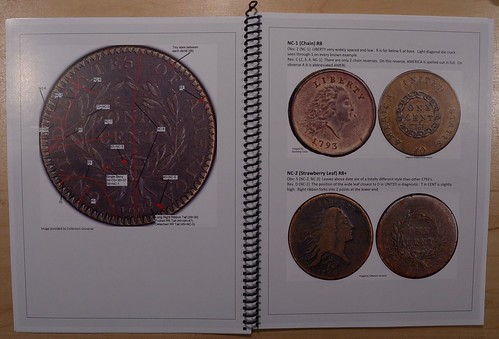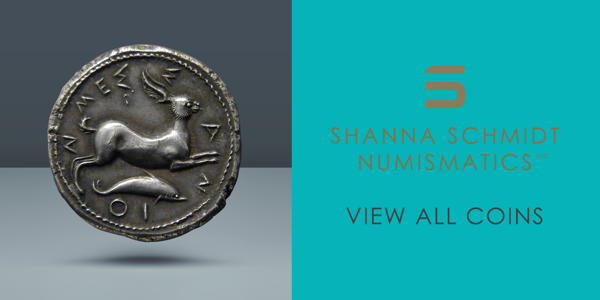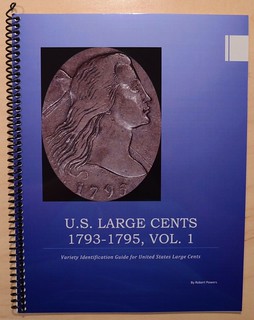
PREV ARTICLE
NEXT ARTICLE
FULL ISSUE
PREV FULL ISSUE
NEW BOOK: 1793-1795 LARGE CENT VARIETY GUIDEAs noted in the previous article, Robert Powers has published a new variety guide for 1793-1795 Large Cents. It's already out of print but David Kahn picked up some copies at the Atlanta ANA convention and has a few for sale. Here's some basic information from the book's first page. -Editor
We will have you quickly and efficiently attributing 1793, 1794, and 1795 large cents in no time. The sole purpose of this guide is to help you rapidly identify the Sheldon number of any example you encounter at a coin show, on the internet, etc. Current census data, pricing information, and other information can easily be found online, or in the Penny Prices publication. Attributing large cents may seem like a complicated business, but it doesn't have to be. Humans tend to be visual learners. Therefore, it is far more efficient to identify die varieties by simply looking at the coin rather than to read a long description which describes what is easier seen. For example, the first things (key points) that you should look at when looking every large cent are the position of LIBERTY above the head, the date spacing and position, and the leaf positions on the reverse. You will then follow up by verifying that every other feature of the coin is in the correct position, shape, size, etc. Check all of your dentil alignments (that's a big one) relative to your letters and numbers in the date. Gather a mental picture. If you find yourself stumped, go through all of the die marriages looking for a reason that the coin in your hand cannot be that variety (ruling out, narrowing the list down). Are you following me? It won't be long before you begin to recognize varieties like you recognize someone's face. These "routine" observations need not be described in detail for each die marriage. In this guide, you will find that most descriptions will focus on unique or unusual features of a given die variety which could be overlooked during your "routine" mental picturing of the coin. Please note that within this book, you will find coins pictured in which the obverse and reverse do not look like the same coin. This is simply because a better photo was available from a different die marriage that shares the same obverse or reverse die, and the pictures were put together as a "Frankenstein" coin. This will be especially helpful on the rare varieties, of which typically only very poor quality photos have been available in the past. Although this volume covers 1793, 1794, and 1795's, we will be placing a special emphasis on the 1794, because it is far more challenging (and rewarding) to attribute, in most cases, than a '93 or '95. On the following four pages, you will find what is known as the "Crack Finder." If you can detect a die crack, you should be able to find it on the Crack Finder.  To order, see:
 Wayne Homren, Editor The Numismatic Bibliomania Society is a non-profit organization promoting numismatic literature. See our web site at coinbooks.org. To submit items for publication in The E-Sylum, write to the Editor at this address: whomren@gmail.com To subscribe go to: https://my.binhost.com/lists/listinfo/esylum All Rights Reserved. NBS Home Page Contact the NBS webmaster 
|
